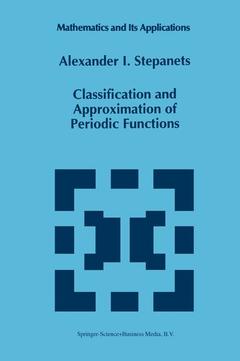Description
Classification and Approximation of Periodic Functions, Softcover reprint of the original 1st ed. 1995
Mathematics and Its Applications Series, Vol. 333
Author: Stepanets A.I.
Language: English
Keywords
Fourier series; convergence; derivative; integral; mathematical analysis
Publication date: 10-2012
366 p. · 16x24 cm · Paperback
366 p. · 16x24 cm · Paperback
Description
/li>Contents
/li>
This monograph proposes a new classification of periodic functions, based on the concept of generalized derivative, defined by introducing multiplicators and shifts of the argument into the Fourier series of the original function. This approach permits the classification of a wide range of functions, including those of which the Fourier series may diverge in integral metric, smooth functions, and infinitely differentiable functions, including analytical and entire ones. These newly introduced classes are then investigated using the traditional problems of the theory of approximation. The results thus obtained offer a new way to look at classical statements for the approximation of differentiable functions, and suggest possibilities to discover new effects. Audience: valuable reading for experts in the field of mathematical analysis and researchers and graduate students interested in the applications of the theory of approximation and Fourier series.
1. Classes of Periodic Functions.- 1. Sets of Summable Functions. Moduli of Continuity.- 2. The Classes H?[a, b] and H?.- 3. Moduli of Continuity in the Spaces Lp. The Classes H?p.- 4. Classes of Differentiable Functions.- 5. Conjugate Functions and Their Classes.- 6. Weil-Nagy Classes.- 7. The Classes.- 8. The Classes.- 9. The Classes 35 10. Order Relation for (?, ? )-Derivatives.- 2. Integral Representations of Deviations of Linear Means Of Fourier Series.- 1. Fourier Sums.- 2. Linear Methods of Summation of Fourier Series. General Aspects.- 3. Integral Representations of ?n(f;x;?).- 4. Representations of Deviations of Fourier Sums on the Sets and.- 5. Representations of Deviations of Fourier Sums on the Sets and.- 3. Approximations by Fourier Sums in the Spaces c and l1.- 1. Simplest Extremal Problems in the Space C.- 2. Simplest Extremal Problems in the Space L1.- 3. Asymptotic Equalities for ? n(H?).- 4. Asymptotic Equalities for.- 5. Moduli of Half-Decay of Convex Functions.- 6. Asymptotic Representations for ?n(f; x) on the Sets.- 7. Asymptotic Equalities for and.- 8. Approximations of Analytic Functions by Fourier Sums in the Uniform Metric.- 9. Approximations of Entire Functions by Fourier Sums in the Uniform Metric.- 10. Asymptotic Equalities for and.- 11. Asymptotic Equalities for and.- 12. Asymptotic Equalities for and.- 13. Approximations of Analytic Functions in the Metric of the Space L.- 14. Asymptotic Equalities for and.- 15. Behavior of a Sequence of Partial Fourier Sums near Their Points of Divergence.- 4. Simultaneous Approximation of Functions and their Derivatives by Fourier Sums.- 1. Statement of the Problem and Auxiliary Facts.- 2. Asymptotic Equalities for.- 3. Asymptotic Equalities for.- 4. Corollaries of Theorems 2.1 and 3.1.- 5.Convergence Rate of the Group of Deviations.- 6. Strong Summability of Fourier Series.- 5. Convergence Rate of Fourier Series and Best Approximations in the Spaces lp.- 1. Approximations in the Space L2.- 2. Jackson Inequalities in the Space L2.- 3. Multiplicators. Marcinkiewicz Theorem. Riesz Theorem. Hardy — Littlewood Theorem.- 4. Imbedding Theorems for the Sets.- 5. Approximations of Functions from the Sets.- 6. Best Approximations of Infinitely Differentiable Functions.- 7. Jackson Inequalities in the Spaces C and Lp.- 6. Best Approximations in the Spaces C and l.- 1. Zeros of Trigonometric Polynomials.- 2. Chebyshev Theorem and de la Vallée Poussin Theorem.- 3. Polynomial of Best Approximation in the Space L.- 4. Approximation of Classes of Convolutions.- 5. Orders of Best Approximations.- 6. Exact Values of Upper Bounds of Best Approximations.- Bibliographical Notes.- References.
© 2024 LAVOISIER S.A.S.




